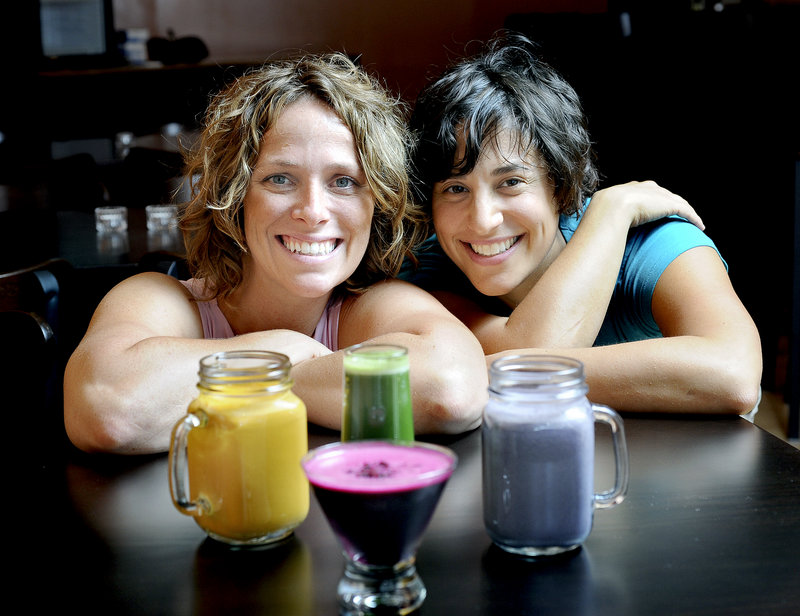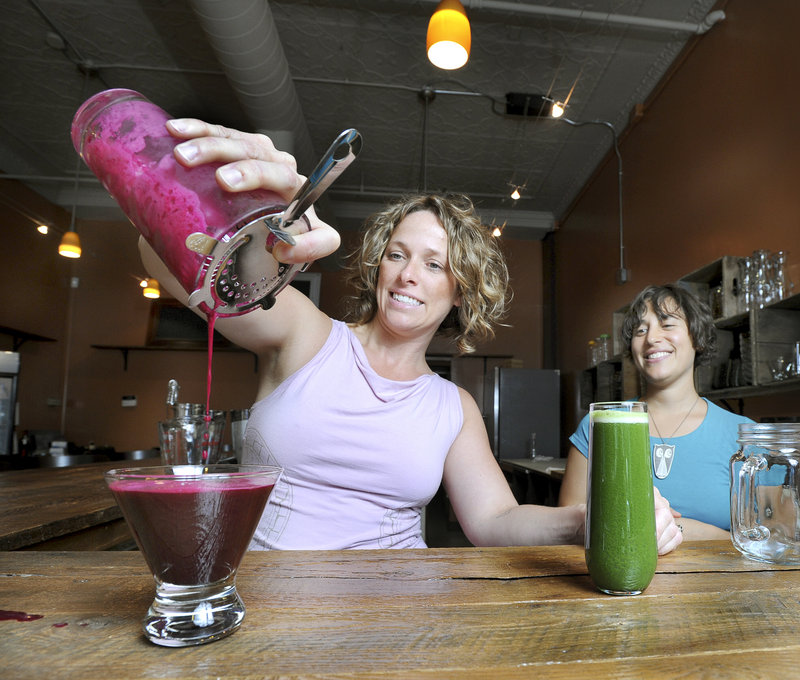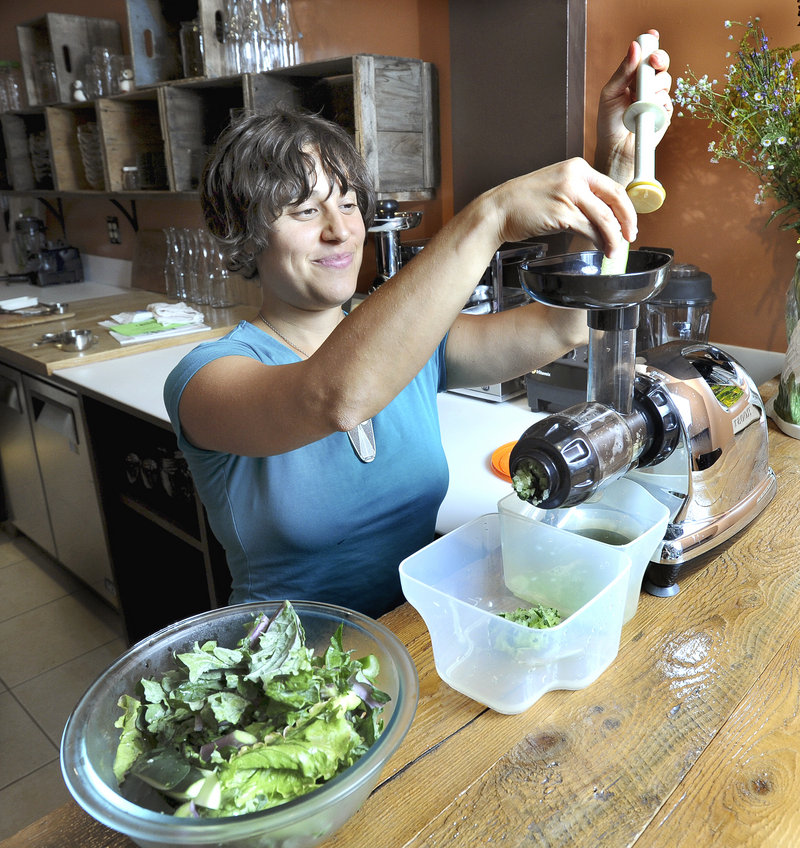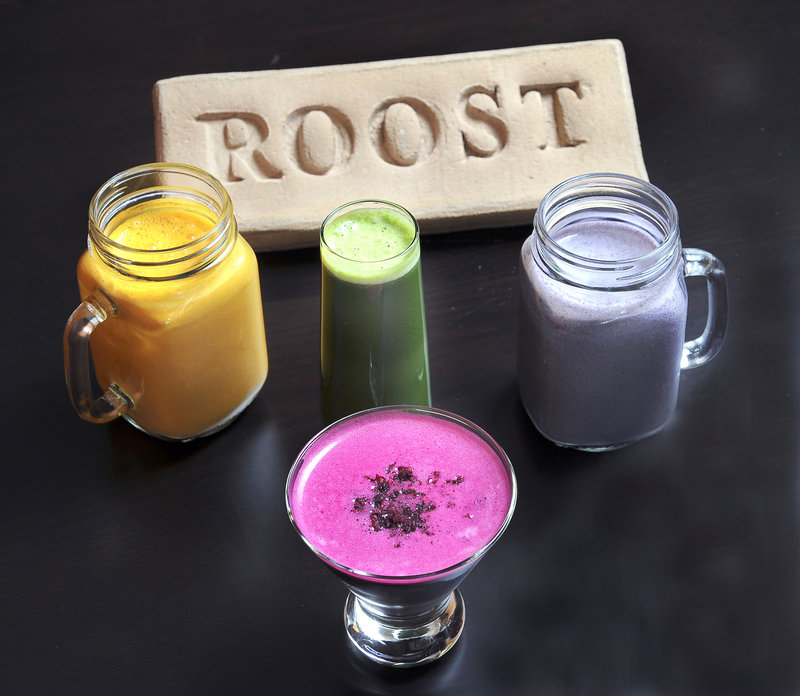From the recipes to the farmers to the service philosophy, everything about Roost House of Juice is carefully crafted to promote health, greater awareness and conscious consumption.
Today, assuming all went according to plan, the Portland raw organic-food restaurant opens to the public. With 38 seats and an all-plant-based menu, the restaurant offers a long list of juices and smoothies and a shorter array of breakfast dishes, small plates for lunch and dinner, desserts and wines.
Kathleen Flanagan and Jeanette Richelson, yoga teachers with experience in the restaurant industry, have been planning this eatery for a year and a half. They worked with a large community of vendors, farmers, business consultants, family members, friends and artists to fine tune the restaurant into a space unique for this foodie town. A Kickstarter campaign to help cover the restaurant’s start-up costs exceeded its goal.
“What we’re doing here is creating conscious recipes using local and organic produce,” Flanagan said.
In 2009, a raw vegan restaurant called GRO Cafe opened in downtown Portland, but it closed after only a short stint when its owner moved on to other business opportunities. While there is a raw foods school on Munjoy Hill and numerous juice bars, Roost becomes the city’s only raw food restaurant and all-organic juice bar.
Located on Free Street near Arabica, Roost is obtaining ingredients from local organic farms certified by the Maine Organic Farmers and Gardeners Association. They include New Beat Farm, Green Spark Farm, Fishbowl Farm, Freedom Farm and Dandelion Spring Farm.
“We wanted to support as much local as possible,” Richelson said. “The local farmers are so amazing, and there’s such abundance here.”
As in everything the pair has done in preparation to open Roost, they acted deliberately and carefully in selecting farmers to work with.
“We believe in eating organic and clean, healthy foods,” Flanagan said. “We went to all these farms and saw how they farmed and observed their practices. It was important to us to know them. What we found is we really believe in the people we’re supporting. How they live their lives and how they treat their land.”
Items that can’t be gotten locally or directly from a local farm will come from a network of carefully vetted distributors, which include Crown O’Maine Organic Cooperative and Farm Fresh Connection.
Another part of the restaurant’s sustainable approach involves using the pulp that results from the Omega juicer to create crackers. The restaurant contracts with Resurgam Zero Food Waste to compost any other food scraps.
At Roost, juices are available in either 8-ounce ($3.50 to $5.50) or 16-ounce ($6 to $7.50) sizes and smoothies are poured in 16-ounce glasses ($4.50 to $8).
Food items range in price from $3.25 for kid-sized snacks up to $9.50 for the sampler plate.
A selection of juices called Fancy-Full are essentially health food cocktails served in a martini glass. One of the juice cocktails, the Red Russian, is made with Russian kale, cranberries and lemons and a choice of Urban Farm Fermentory’s Ginger Kombucha, Oak Barrel Kombucha, sparkling water or prosecco.
All juices and smoothies will be made-to-order, with the exception of the three fresh juices available for grab-and-go each day. These will be made on a Norwalk Hydraulic Juice Press, a sophisticated machine which creates juices with very low oxidation, allowing them to be refrigerated before serving without losing flavor or nutrients.
The to-go juices will include the Regulator (containing kale, spinach, romaine lettuce, cucumber, celery, lemon and apple), Return of the Radi (made from radish, carrot and apple juice) and Emerge & See (containing vitamin C, cayenne, apple and ginger).
All the recipes are the result of extensive experimentation, testing and tweaking.
“Nothing tastes like grass,” Flanagan said with a grin. “That’s one thing we’re really clear on.”
While there will always be juices and raw treats ready for people who are on their way to work or don’t have time to wait, the restaurant aims to provide a more relaxed vibe complete with table service.
“Our intention is to create an atmosphere that’s not a fast food juice bar,” Flanagan said. “We don’t want anyone to feel rushed. We want people to come here and just take a moment.”
Customers will be greeted at the door and invited to either visit the to-go bar at the back of the restaurant or seat themselves at the large bar or one of the tables, where they will be given menus and served.
Food offerings include things like dehydrated granola and house-made whipped cashew cream from the breakfast menu, collard green wraps filled with vegetables and house-made nut spreads from the small plates menu, and Roosticles, a dairy-free, soy-free frozen popsicle in three flavors from the dessert menu.
The menu may be distinct among Maine restaurants, but the owners don’t intend it to be a statement about how people should eat, but rather an option for folks looking for a burst of energy and an infusion of healthfulness.
“From the get-go, we wanted to make sure we weren’t excluding anyone or preaching that anyone should eat a certain way,” Richelson said.
Richelson has studied at the Institute for Integrative Nutrition in New York City and has training in raw food preparation.
When she lived in California, Richelson worked at the iconic health food restaurant Cafe Gratitude, a chain of raw vegan restaurants in and around San Francisco. That’s where she was introduced to raw foods and the concept of Sacred Commerce. The philosophy advocates for creating businesses that provide a path to spiritual awakening by incorporating concepts of sustainability, respect and reverence into the workplace.
Richelson said they choose to incorporate the philosophy into their business model because “we wanted to create move vitality for everyone who comes into contact with Roost.”
Before moving to Maine a couple years ago, Flanagan lived in Manhattan for 10 years and worked for high-end restaurants owned by the BR Guest Hospitality corporation.
While working for the company, she attended wine college, where she gained extensive knowledge of the industry. She used the experience when working with Crush Distributors to create a list of wines that are produced using organic, sustainable or vegan methods. Served by the glass, the wine is priced between $6.50 and $9.
While Richelson learned about raw food while working in a restaurant, Flanagan said she first encountered raw food at a juice bar in New York City.
“I can distinctly remember my first hardcore green juice,” Flanagan said. “I canceled my cable to afford my green juice at $8 a day.”
Staff Writer Avery Yale Kamila can be contacted at 791-6297 or at: akamila@pressherald.com
Twitter: AveryYaleKamila
Send questions/comments to the editors.






Comments are no longer available on this story